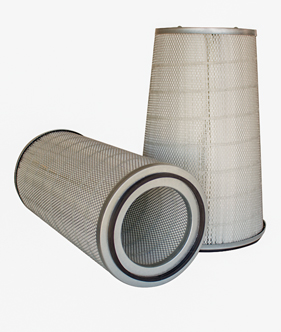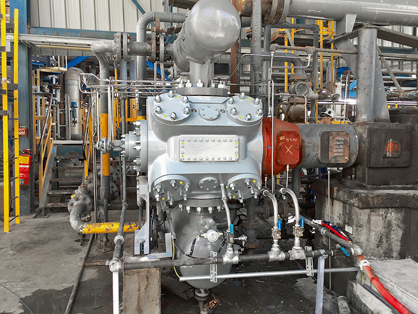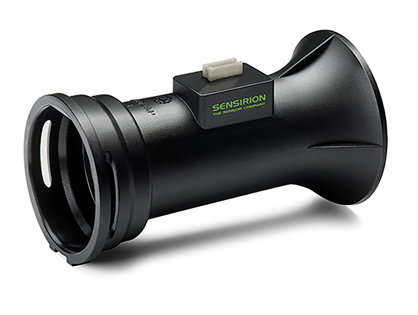New in Gas Processing Technology
Parker gas turbine filtration eyes Middle East expansion
Parker Hannifin is strengthening its global presence with the launch of a new factory in Dammam, Saudi Arabia, in partnership with Tamimi Energy. The launch is expected to replicate Parker’s successful operations in North America.
 |
The expansion is in line with Saudi Arabia’s Vision 2030 plan, calling for the diversification of revenues by capitalizing on in-country production and the employment of Saudi nationals. The factory will facilitate the production of inlet filters for gas turbines in both Saudi Arabia and the broader Gulf Cooperation Council.
Burckhardt Compression revamps compressors in Israel
The Israeli government recently tightened its health, safety and environment (HSE) regulations. As a result, PAZ Ashdod Refinery was forced to revamp its existing process gas compressors for hydrogen application to comply with the stricter HSE standards. PAZ entrusted Burckhardt Compression to both perform this task and to restore the performance of the compressors of another original equipment manufacturer (OEM).
 |
The PAZ Ashdod Refinery is located in the coastal city of Ashdod and is the second-largest oil refinery in Israel. It operates to the strictest environmental and safety standards while producing high-quality products and investing in improved capabilities and content.
PAZ Ashdod decided against a 1:1 replacement of the original OEM compressors, opting instead for a general revamp to the latest technology update conducted by Burckhardt Compression. In this way, a continuous improvement of HSE compliancy was guaranteed.
Burckhardt Compression upgraded the three hydrogen compressors to the latest technology, including conformity with API 618 (5th edition). It also applied advanced technology designs to cylinders, as shown in the photo, as well as all related compressor components. Finally, it installed a new motor with flexible coupling for lower maintenance and higher reliability.
The project was concluded in 2017, with the compressors running successfully.
Siemens launches Pipelines 4.0 for NA operators
Siemens has launched Pipelines 4.0, an integrated approach to the engineering, supply and lifecycle optimization of pipeline assets, tailored to meet the evolving needs of North American (NA) midstream operators.
The solution combines equipment and turnkey packages for pipeline stations with data analytics, lifecycle service and cyber security. It builds on the company’s extensive pipeline experience, product breadth and domain expertise in rotating equipment, electrification, automation and digitalization.
While unconventional resource development has enhanced production in North America, it has also strained transportation infrastructure, namely pipelines, which are the most efficient means to move oil and gas to market. The resulting bottleneck poses an obstacle to the entire industry.
Despite the pressing demand for pipelines, operators face a number of challenges. These challenges include a potentially “lower for longer” price of oil and gas, intense competition, the need to reduce CAPEX and OPEX, aging assets, the effective management of large amounts of data, cyber security concerns, tightening legislation and the looming retirement of experienced personnel.
Pipelines 4.0 comprises integrated offerings and turnkey solutions for pump and compressor stations to enhance efficiency; data analytics and lifecycle services to optimize critical asset performance; cyber security services to protect information and “smart” equipment; and dedicated support teams to facilitate inter-company communications.
A major supplier on multiple large-scale projects, Siemens supports liquids and natural gas pipelines, with a focus on pump and compressor stations, as well as on tank farms, terminals and storage facilities.
Pursuant to Pipelines 4.0, the company has added integrated packages to its portfolio, such as an electric-motor-driven (EMD) compressor. The EMD is pre-engineered for efficient installation and startup, thereby allowing operators to significantly reduce project lead times.
Siemens offers an extended electrification package that includes compressors, drives, motors, skids, automation, e-shelters, sub-stations and transformers, enabling operators to further streamline interfaces and reduce risk.
On the data analytics front, the company recently developed Smart Pump to optimize the power consumption of pipeline pump stations. Siemens has invested more than €10 B in software acquisitions in the last 10 yr and is now one of the world’s top 10 software companies. Software-based solutions include the use of digital twins and the company’s IoT platform, MindSphere, to optimize pipeline asset performance from pre-FEED through the entire asset lifecycle.
Rounding out Pipelines 4.0, Siemens offers several business and financing models, including leasing, debt financing and equity investments.
Wison delivers world’s first barge-based FSRU to Exmar
Wison Offshore & Marine has completed final delivery of the world’s first barge-based floating LNG storage and regasification unit (FSRU) to Belgian company Exmar, which has also confirmed that long-term use of the FSRU starting from mid-2018 has been secured.
The FSRU barge features an LNG storage capacity of 25,000 m³ and a regasification capacity
of 600 MMsft3d. It is the first FSRU project undertaken by a Chinese company on an EPC basis.
The project was executed with a quest for efficiency and openness to innovation. The modularized approach shortened the schedule and lowered the risks associated with the construction phase. A dedicated cargo handling system for the
SPB tanks was also developed.
Pöyry to supervise gas-fired power plant in Malaysia
Under an owner’s engineer services assignment from Southern Power Generation Sdn Bhd, Pöyry will manage and review the design for a 1,440-MW combined-cycle power plant project in Johor, Malaysia. Southern Power Generation was established for this independent power producer project.
The facility will consist of two 720-MW gas-fired combined-cycle blocks, with distillate as backup fuel. Each block consists of a GE 9HA.02 gas turbine and a triple-pressure reheat once-through heat recovery steam generator and steam turbine in a single-shaft configuration. The project also includes a 275-kV air-insulated substation and a 132-kV gas-insulated substation.
MHI to license CO2 capture technology to Russian company
Mitsubishi Heavy Industries Ltd. (MHI) has concluded an agreement to license technology for its flue gas carbon dioxide (CO2) capture plant to PJSC Metafrax, a major Russian chemical company.
MHI’s flue gas CO2 capture technology, known as the KM CDR Process, uses an advanced absorption solvent (KS-1), jointly developed with Kansai Electric Power Co. Inc., to achieve substantial reductions in energy consumption compared with earlier methods.
Metafrax will use recovered CO2 to produce 894 tpd of ammonia, 1,725 tpd of urea and 40,000 tpy of melamine from the byproducts of a methanol plant. The plant will installed at a facility in Perm, located on the western side of the Ural Mountains, and is scheduled for completion in 2021.
Microthermal technology for gas metering
New environmentally friendly technologies, such as power-to-gas and biogas production systems, will change requirements for the entire natural gas industry, including gas metering. Due to these trends, future gas metering will be confronted with new mixtures of natural gas, including those that contain significant amounts of non-conventional fuel gases, such as hydrogen or carbon dioxide.
 |
These new gas mixtures present a challenge for the technologies currently used in natural gas metering. Sensirion has developed a breakthrough in microthermal gas metering using a new technology to measure thermal gas characteristics.
The company’s SGM6200 module covers natural gases in group E with up to 25% hydrogen content, at an existing consumption below 10 µA. Sensirion plans to commercialize this technology by adding the new SGM6200 series to its product portfolio of SGM6000 modules.
Furthermore, the company believes that the SGM6200 series fulfills both current and future market requirements. One module covers natural gases in groups H, L and E (as defined in EN437), as well as natural gas mixtures.
The SGM6200 family will be used for temperature-compensated gas volumes, aligned with the most widely used billing systems for natural gas. Competitive prices and ultra-low consumption below 10 µA enable Sensirion’s customers to design competitive, cutting-edge meters for natural gas.
Start of production for the G4 module of the SGM6200 family is planned for 3Q 2018. By assessing additional physical properties of natural gas, the SGM6200 series will help realize Sensirion’s vision of direct energy content monitoring of natural gas in gas meters.




Comments